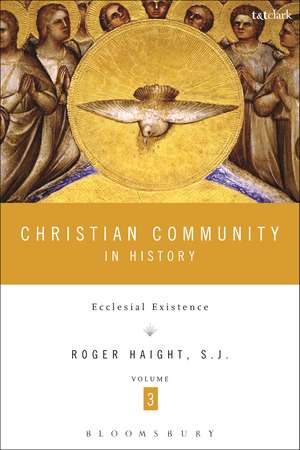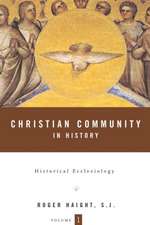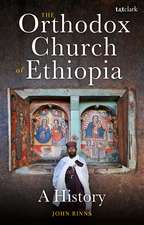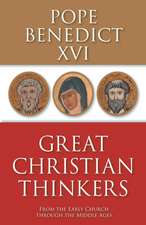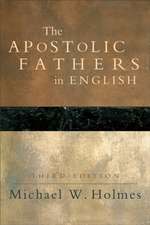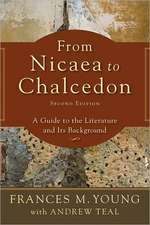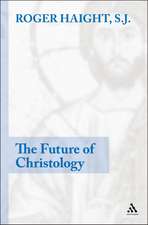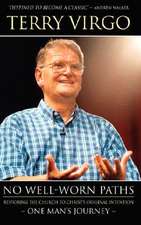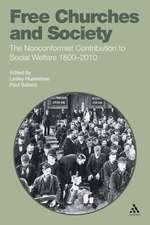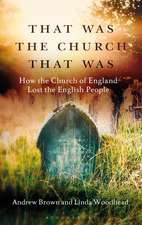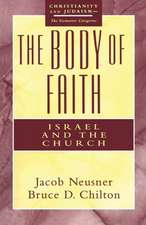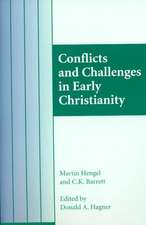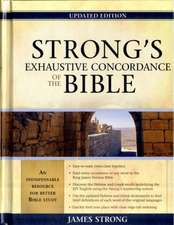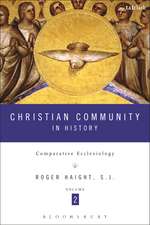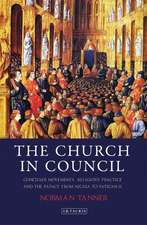Christian Community in History, Volume 3: Ecclesial Existence
Autor Rev Prof Roger D. Haighten Limba Engleză Paperback – 18 iun 2014
Preț: 194.50 lei
Preț vechi: 224.50 lei
-13% Nou
Puncte Express: 292
Preț estimativ în valută:
37.22€ • 38.64$ • 31.04£
37.22€ • 38.64$ • 31.04£
Carte disponibilă
Livrare economică 03-17 martie
Preluare comenzi: 021 569.72.76
Specificații
ISBN-13: 9781623564179
ISBN-10: 1623564174
Pagini: 320
Dimensiuni: 156 x 234 x 25 mm
Greutate: 0.5 kg
Editura: Bloomsbury Publishing
Colecția T&T Clark
Locul publicării:London, United Kingdom
ISBN-10: 1623564174
Pagini: 320
Dimensiuni: 156 x 234 x 25 mm
Greutate: 0.5 kg
Editura: Bloomsbury Publishing
Colecția T&T Clark
Locul publicării:London, United Kingdom
Caracteristici
The completion of a major work by a highly respected, though controversial theologian.
Notă biografică
Roger Haight, SJ, has a PhD from the University of Chicago (1973) and a STL from the Jesuit School of Theology in Chicago (1981). He has taught for over 30 years in Jesuit schools of theology in Chicago, Toronto, the Philippines, and Cambridge, Massachusetts. He has been a visiting professor in France, India, Peru, and Kenya. He is a past president of the Catholic Theological Society of America (1994/95). Jesus Symbol of God won 1st place in the Catholic Press Association's 2000 Book Award for theology. Dynamics of Theology won 2nd place in CPA's 1991 Book Award for Theology. His most recent work is Christian Community in History in 2 volumes. He currently teaches at Union Theological Seminary in New York City.
Cuprins
Contents Preface Part I THE NOTION OF A CONSTRUCTIVE TRANSDENOMINATIONAL ECCLESIOLOGY 1. WHERE WE DWELL IN COMMON 2. FROM HISTORICAL TO CONSTRUCTIVE ECCLESIOLOGY Part II ECCLESIAL EXISTENCE 3. THE NATURE AND PURPOSE OF THE CHURCH4. ORGANIZATION OF THE CHURCH 5. MEMBERSHIP IN THE CHURCH 6. ACTIVITIES OF THE CHURCH 7. CHURCH IN RELATION TO THE WORLD 8. ECCLESIAL EXISTENCE AND PARTIAL COMMUNION
Recenzii
[Part of a] landmark work ... For many who are familiar only with the ecclesiology of their own church or denomination, it can be a horizon-expanding experience. And for someone who has given up hope of the churches ever reaching an ecumenical understanding of church, it can give a sense of how that might be accomplished.
With Ecclesial Existence, Roger Haight has completed the impressive trilogy Christian Community in History. Drawing on an impressive knowledge of how the Church has been understood through the ages, Haight moves beyond history to probe the essence of the Church in all its diversity. The heart of the Church is a spirituality that is shared by all parts of divided Christendom. This major contribution to the study of the Church and its unity is essential reading for students and teachers of theology and all engaged in the ecumenical enterprise. A crowning achievement.
"Roger Haight here completes his distinguished ecclesiological trilogy with a brilliant third volume challenging regnant conceptions of the search for unity among the different communions. His notion of "ecclesial existence" as an already-shared apostolic reality across all the different expressions of "church" leads him to ask if some form of "partial communion" among our diverse ecclesial cultures might now be a reachable ecumenical goal. This proposal is backed with detailed and painstaking scholarship. It is well worth considering from local congregations to the highest levels of ecclesiastical authority. It could help to break up the current ecumenical logjam and get the Faith and Order juices flowing again." - Lewis S. Mudge, Robert Leighton Stuart Professor of Theology, Emeritus, San Francisco Theological Seminary and the Graduate Theological Union, Berkeley
"This 'transdenominational ecclesiology' by a master theologian will help Christians better understand the distinctiveness of their own ecclesial adherences. Brilliantly drawing upon recent ecumenical consensus statements, Haight concludes that despite differing articulations Christians share a solid common framework." - Michael A. Fahey, S.J., Boston College
Mention - New Testament Abstracts, Vol. 52 No. 3, 2008
"This is the third and final volume of a historical and systematic overview of comparative theologies of the church. A significant contribution to the contemporary debates on ecclesiology among the churches, it follows two comparative historical volumes, providing a theology "from below."...We can welcome this intentional probing of the nature and mission of the church, and the methodological debates to which it contributes. As a set of hypotheses to be tested by scholars in the churches and in the ecumenical field, it will undoubtedly engender much-needed discussion and, it is hoped, more convincing solutions to the divisions among Christians...the erudition manifest in Ecclesial Existence and its two predecessors will be greatly rewarding for many." -Jeffery Gros, F.S.C., America, December 15, 2008
"Anyone who has been involved in the ecumenical movement feels a deep sense of frustration that accompanies and challenges our hopes. Ecumenical progress depends ultimately on God; it sometimes seems that the only thing humanly possible that might contribute to such progress would be if an Alexander might come along and cut the Gordian knot. Haight has taken a mighty swing at it. His landmark study of the ecclesial existence shared by all who participate in the whole Christian movement opens up new paths that may ultimately help others, perhaps some whose support of pluralism is less susceptible to the charge of ecclesiological relativism, to take their swings." -Dennis M. Doyle, Worship, January 2009
"H.'s work offers rich resources for all future ecumenical and interfaith endeavors, as well as for social alliances aimed at enhancing justice and peace. All who are committed to a positive future for Christianity should read this outstanding work. Ecumenical initiatives hereafter will forever be in H.'s debt. He has crafted a practical means of discerning and transcending divisions and differences without pretending they do not exist." -Gerard Mannion, Theological Studies, March 2009
'Haight adds his own perceptive commentary and critique, tackling, sometimes with remarkable sharpness, the 'hard questions' which some of the more evident differences throw up, sometimes providing a discussion which points to creative ways of overcoming such tensions ... the accumulation of observations about communalities across the churches makes a compelling case - and there are moments when there are flahes of razorsharp wit ... This volume of Haight's triology is a work of constructive, as opposed to historical, theology.' Expository Times, May 2009
German review in Theologische Literaturzeitung, 2009
"We must be extremely grateful to him for this gigantic effort. His thought and language are clear , flowing, logical.His effort to a re-reading of theology from an ecumenical perspective must certainly enrich any reader, student or professor, who has recourse to this book. It is thought-provoking and hopefully initiate a new canto in the symphony of the churches."Journal of theological reflection, Vol. 73/2 February 2009
mention in Church Times, 5 June 2009
"The trilogy will long be the standard reference work in the field...Excellent points of reference and challenges. The book will best serve professional theologians and ecumenists in helping to clarify their methods and positions, and can be useful in graduate seminars." -John J. Burkhard, O.F.M. Conv., New Theology Review
With Ecclesial Existence, Roger Haight has completed the impressive trilogy Christian Community in History. Drawing on an impressive knowledge of how the Church has been understood through the ages, Haight moves beyond history to probe the essence of the Church in all its diversity. The heart of the Church is a spirituality that is shared by all parts of divided Christendom. This major contribution to the study of the Church and its unity is essential reading for students and teachers of theology and all engaged in the ecumenical enterprise. A crowning achievement.
"Roger Haight here completes his distinguished ecclesiological trilogy with a brilliant third volume challenging regnant conceptions of the search for unity among the different communions. His notion of "ecclesial existence" as an already-shared apostolic reality across all the different expressions of "church" leads him to ask if some form of "partial communion" among our diverse ecclesial cultures might now be a reachable ecumenical goal. This proposal is backed with detailed and painstaking scholarship. It is well worth considering from local congregations to the highest levels of ecclesiastical authority. It could help to break up the current ecumenical logjam and get the Faith and Order juices flowing again." - Lewis S. Mudge, Robert Leighton Stuart Professor of Theology, Emeritus, San Francisco Theological Seminary and the Graduate Theological Union, Berkeley
"This 'transdenominational ecclesiology' by a master theologian will help Christians better understand the distinctiveness of their own ecclesial adherences. Brilliantly drawing upon recent ecumenical consensus statements, Haight concludes that despite differing articulations Christians share a solid common framework." - Michael A. Fahey, S.J., Boston College
Mention - New Testament Abstracts, Vol. 52 No. 3, 2008
"This is the third and final volume of a historical and systematic overview of comparative theologies of the church. A significant contribution to the contemporary debates on ecclesiology among the churches, it follows two comparative historical volumes, providing a theology "from below."...We can welcome this intentional probing of the nature and mission of the church, and the methodological debates to which it contributes. As a set of hypotheses to be tested by scholars in the churches and in the ecumenical field, it will undoubtedly engender much-needed discussion and, it is hoped, more convincing solutions to the divisions among Christians...the erudition manifest in Ecclesial Existence and its two predecessors will be greatly rewarding for many." -Jeffery Gros, F.S.C., America, December 15, 2008
"Anyone who has been involved in the ecumenical movement feels a deep sense of frustration that accompanies and challenges our hopes. Ecumenical progress depends ultimately on God; it sometimes seems that the only thing humanly possible that might contribute to such progress would be if an Alexander might come along and cut the Gordian knot. Haight has taken a mighty swing at it. His landmark study of the ecclesial existence shared by all who participate in the whole Christian movement opens up new paths that may ultimately help others, perhaps some whose support of pluralism is less susceptible to the charge of ecclesiological relativism, to take their swings." -Dennis M. Doyle, Worship, January 2009
"H.'s work offers rich resources for all future ecumenical and interfaith endeavors, as well as for social alliances aimed at enhancing justice and peace. All who are committed to a positive future for Christianity should read this outstanding work. Ecumenical initiatives hereafter will forever be in H.'s debt. He has crafted a practical means of discerning and transcending divisions and differences without pretending they do not exist." -Gerard Mannion, Theological Studies, March 2009
'Haight adds his own perceptive commentary and critique, tackling, sometimes with remarkable sharpness, the 'hard questions' which some of the more evident differences throw up, sometimes providing a discussion which points to creative ways of overcoming such tensions ... the accumulation of observations about communalities across the churches makes a compelling case - and there are moments when there are flahes of razorsharp wit ... This volume of Haight's triology is a work of constructive, as opposed to historical, theology.' Expository Times, May 2009
German review in Theologische Literaturzeitung, 2009
"We must be extremely grateful to him for this gigantic effort. His thought and language are clear , flowing, logical.His effort to a re-reading of theology from an ecumenical perspective must certainly enrich any reader, student or professor, who has recourse to this book. It is thought-provoking and hopefully initiate a new canto in the symphony of the churches."Journal of theological reflection, Vol. 73/2 February 2009
mention in Church Times, 5 June 2009
"The trilogy will long be the standard reference work in the field...Excellent points of reference and challenges. The book will best serve professional theologians and ecumenists in helping to clarify their methods and positions, and can be useful in graduate seminars." -John J. Burkhard, O.F.M. Conv., New Theology Review
